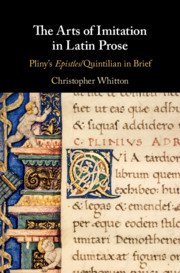3 results
Chapter 6 - On Length, in Brief (Ep. 1.20)
-
- Book:
- The Arts of Imitation in Latin Prose
- Published online:
- 10 June 2019
- Print publication:
- 27 June 2019, pp 192-248
-
- Chapter
- Export citation
Chapter 11 - Quintilian, Pliny, Tacitus
-
- Book:
- The Arts of Imitation in Latin Prose
- Published online:
- 10 June 2019
- Print publication:
- 27 June 2019, pp 407-472
-
- Chapter
- Export citation

The Arts of Imitation in Latin Prose
- Pliny's Epistles/Quintilian in Brief
-
- Published online:
- 10 June 2019
- Print publication:
- 27 June 2019

